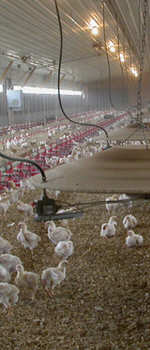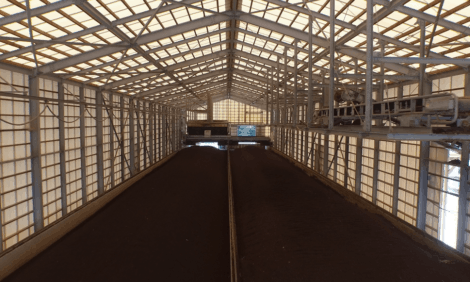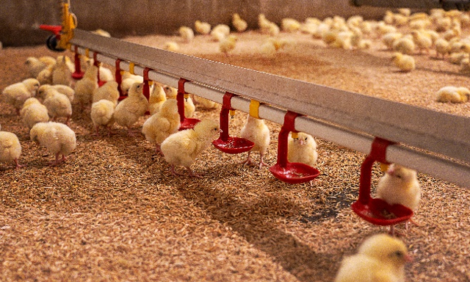



Footballs for broilers
By Richard Allison, Hubbard Europe - Giving fully housed birds footballs to kick around, straw bales to perch on and more space may sound far fetched, but one West Country company believes this high welfare approach will prove profitable.Enriched Broilers
Consumers can now buy high welfare chicken, which has been made possible by combining the slower growing Devonshire White breed with Freedom Foods. Being naturally slower growing and an inquisitive bird by nature, Andrew Maunder of Lloyd Maunder believes Devonshire Whites are ideal in high welfare systems. They are robust with high liveability, and good natural strength, particularly in the legs.
Over the past year, the Devonshire White (Hubbard JA57) has proven itself in free-range systems. So Mr Maunder thought why not rear them under Freedom Food standards in a closed house system. In the new system, birds grow at about 42g/day compared with 60g/day for commercial fast growing birds. This is crucial since the system requires birds to be reared for 25% longer, being slaughtered at day 42 or later.
Also required under the standards is to provide an enriched environment in the broiler house. Mr Maunder admits that they are still refining the system. "We are experimenting with footballs and toys hanging from the ceiling on string. Chicks gather around the ball and push it around the shed."
The enriched environment also includes straw bales and wooden perches. It's surprising that chicks will perch at such a young age, the aim being to encourage natural behaviour, such as dust bathing.
Bob Waller, Freedom Foods tech nical development manager, stressed that the welfare standards don't tell producers how to enrich the environment. But he advises using a system similar to that developed by Lloyd Maunder.
Freedom Food standards also require that birds receive eight hours' continuous darkness within each 24 hour period with gradual changes to mimic dawn/dusk. Ideally, Mr Waller would like to see natural daylight in houses but he admits this can bring additional problems, such as birds becoming frightened each time a predatory bird flies over the unit.
Also different from a conventional system is the lower stocking rate of 30kg/m sq at slaughter, compared with 38kglm sq under the Red Tractor Scheme. Mr Waller highlighted that this equates to 20% more space.
He believes this lower stocking rate allows better litter management and fewer leg problems including hock burns. This is because there is less pressure on the ventilation system to keep litter dry.
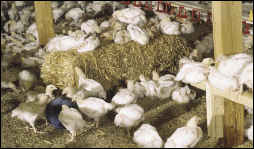 Lloyd Maunder is still experimenting with perchs and footballs with Devonshire whites reared under Freedom Food standards |
Costs
Even with these improvements, Mr Maunder admits there is a cost. "Inevitably, the lower stocking rate means fewer birds and there is the cost of carrying the Freedom Foods label. But the company is striving to improve welfare and believes this is the way forward. Consumers are becoming more interested in where their food comes from and welfare is affecting decisions, not just price.
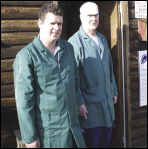 Farm manager Jim Downey and his assistant Phil Martin have seen a reduction in mortality |
Mr Waller explained that the costs of joining the Freedom Food scheme include a one off inspection fee to licence the premises and the company then pays Freedom Foods 2% of the wholesale value of the produce sold. Once in the scheme, there is a 40% chance that auditors will visit a particular unit each year. "Inspections are unannounced and occur with birds in place.
Standards are requirements and units will fail if they don't meet them. The RSPCA based the rules on the Farm Animal Welfare Council's five freedoms, which include freedom from hunger, thirst, discomfort, pain, fear distress and the freedom to express normal behaviour, said Steve Tait, also of Freedom Foods. The new range of whole birds and portion packs will initially be available in 70 Sainsbury's and 200 Somerfield stares.
Source: Hubbard - January 2005







